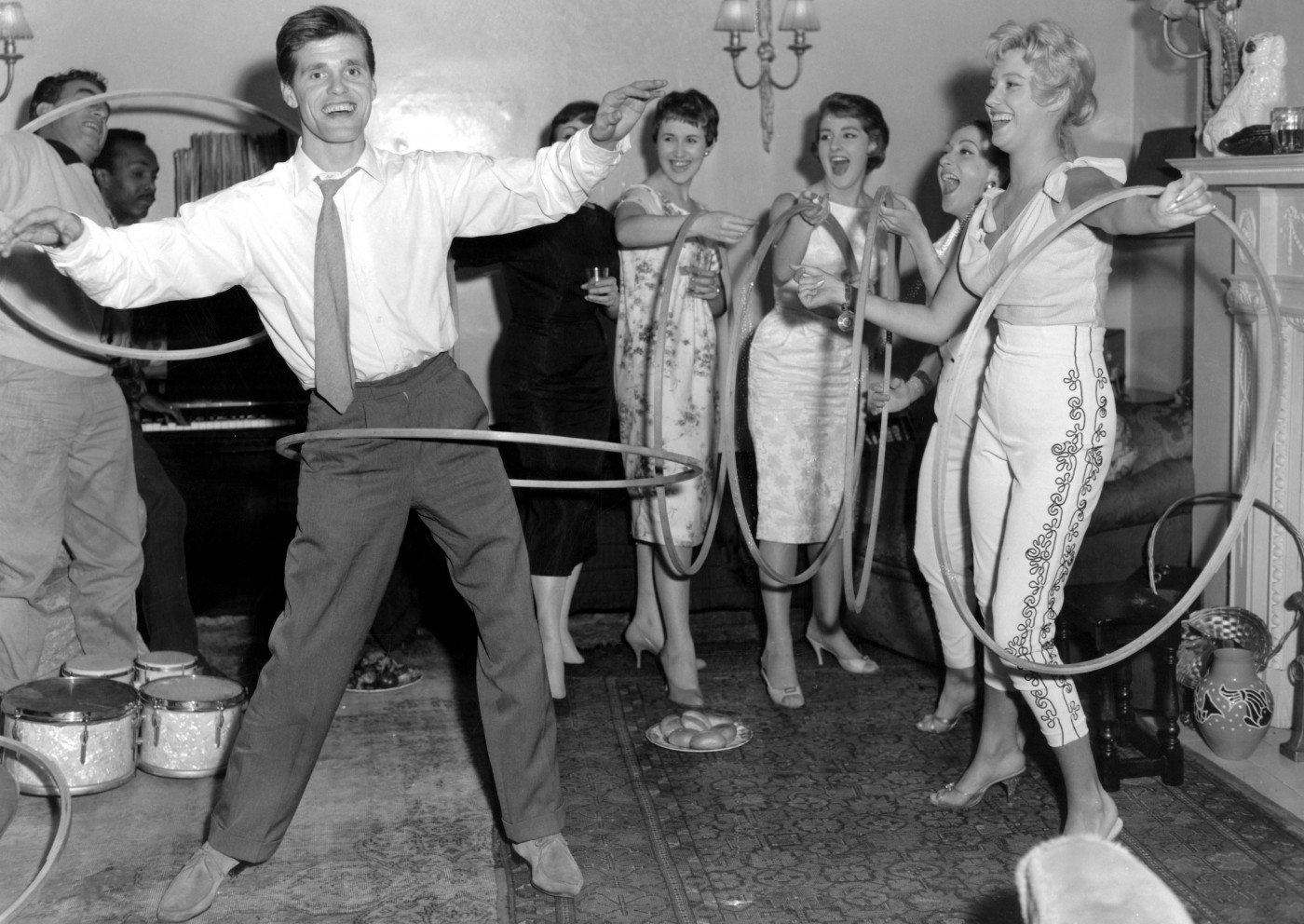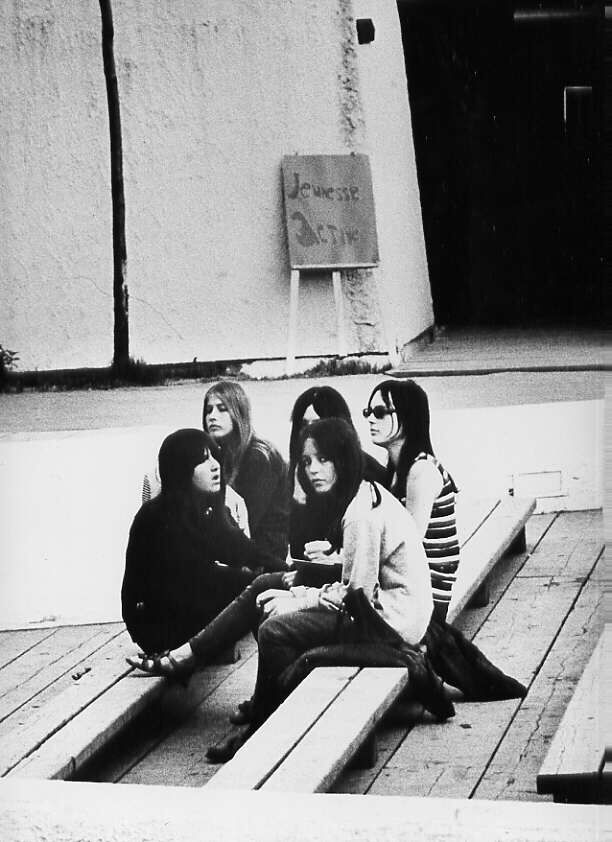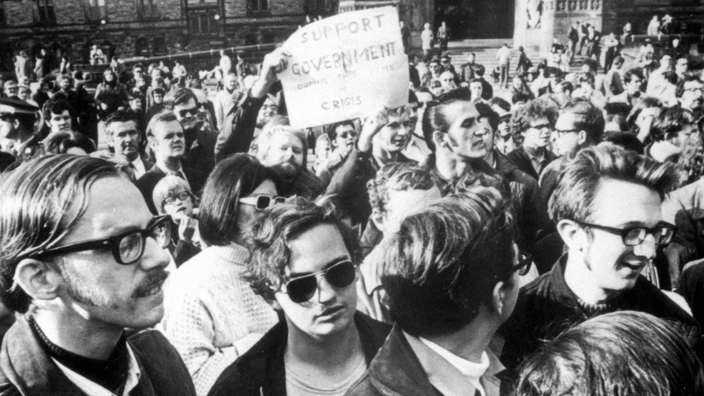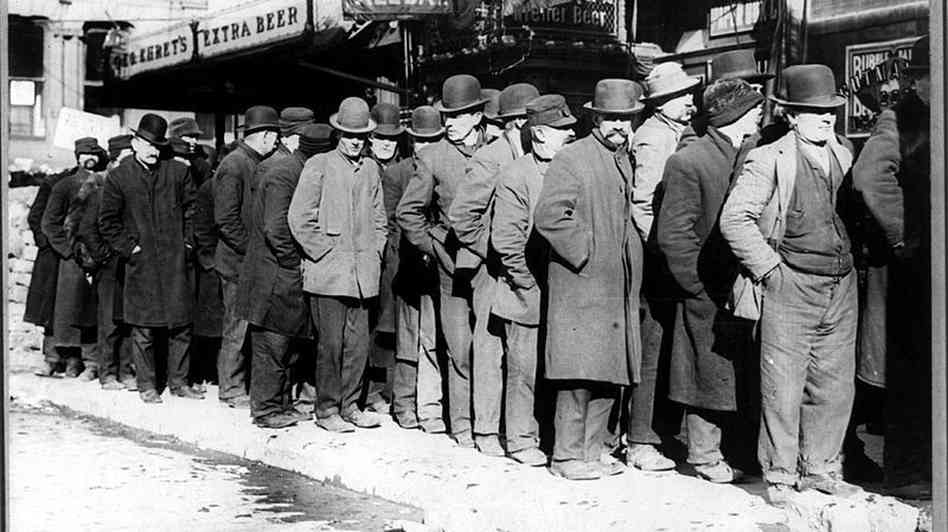Translation Found: Dawson’s Oral History
Great Depression, War, October Crisis, and Referendum. Dawson students hear about these historic events from their grandparents. The following is part of a series of interviews carried out by students in Western Civilization class of Diane Shea. The interviews have been summarized to capture the essence of each Dawson student's encounter with a personal history that spans decades of hunger, language, war, crisis, and the beauty of being here on earth. Because the stories are so personal and dramatic, at times only the initials and field of study of each subject is provided for each student. These are but a few of their stories.
Transpicuous: To See Through
1956: It was only 4 years after its invention. My grandmother Lorraine Bernard was 14 years old when television appeared in her living room, revealing the world to her for the first time. This invention showed her things that established her identity and her place among everyone. She discovered that other people were living a hard life like her, and that there were other things to do in life than farming. She also realized that most Quebeckers had the same culture, religion, and language. Then, she heard on TV about the feminist movement and joined in the fight for gender equality.
 When my grandmother was a teenager, she wasn’t really interested in the news. Like most teenagers, she loved music and celebrities, and television revealed a new world filled with different music and fashion trends that she had never known about before. She discovered American TV shows, music groups and singers like the Beatles and Elvis Presley and new styles of dance like the Twist. When her brothers, sisters, and herself went to the theatre to see their favourite music groups, sometimes conflicts erupted due to my grandmother’s parents -my great grandparents- not wanting them to see these performances. To my great grandparents, it was new, it was different, and it was dangerous.
When my grandmother was a teenager, she wasn’t really interested in the news. Like most teenagers, she loved music and celebrities, and television revealed a new world filled with different music and fashion trends that she had never known about before. She discovered American TV shows, music groups and singers like the Beatles and Elvis Presley and new styles of dance like the Twist. When her brothers, sisters, and herself went to the theatre to see their favourite music groups, sometimes conflicts erupted due to my grandmother’s parents -my great grandparents- not wanting them to see these performances. To my great grandparents, it was new, it was different, and it was dangerous.
It was television that opened the universe of dance and travel for my grandmother, and as her family drew closer from gathering together in front of the television and the discussions that came after. Lorraine felt less naïve. She was relieved to know that other people near them living the same hard farm life had found solutions to help them. Now, she is also a feminist and follows the news. She encourages people to discover the world not only in front of a screen as she first did, but by putting their feet on the land they want to visit.
My grandfather, Roger Bernard, had a different story: In 1960, his life and job literally changed. The Quiet Revolution started. People thought that they could change the world, and having fun became a lifestyle in many ways. This affected my grandfather's work as a high school geography teacher in Nicolet at the age of 21.The principal would allow students to skip courses they didn't feel like going to, and just hang out in the corridors instead. The education system at this time was based on the students having fun, so students were allowed to pick and choose their favourite classes. If students weren’t happy at school, they didn’t have to go!
 Some teachers,like my grandfather, had a lot of students in their classroom and others had none. His goal was to help students learn while having fun, but the hardest part was planning his course for everybody, as the students weren’t all at the same level. He had to make separate lessons for the different students within the class. His goal was to help students learn while having fun. This period made him realised that he had to be present in his students’ life in order to help them reach their goals, whatever these goals were. My grandfather remembers that a lot of students were always around his desk talking with him without doing any work in class. They were only there to talk with him because he was really close to his students. It was really hard to teach but it was also really funny and interesting. Students who came to his course were motivated to learn and he became more passionate about his work. He helped people integrating the school by making them talked about what they loved. He is really proud of what he did as he became a more passionate and comprehensive teacher and man. He increased his self-esteem by helping the students live their passions and dreams and he changed his way of seeing the world in a more positive way.
Some teachers,like my grandfather, had a lot of students in their classroom and others had none. His goal was to help students learn while having fun, but the hardest part was planning his course for everybody, as the students weren’t all at the same level. He had to make separate lessons for the different students within the class. His goal was to help students learn while having fun. This period made him realised that he had to be present in his students’ life in order to help them reach their goals, whatever these goals were. My grandfather remembers that a lot of students were always around his desk talking with him without doing any work in class. They were only there to talk with him because he was really close to his students. It was really hard to teach but it was also really funny and interesting. Students who came to his course were motivated to learn and he became more passionate about his work. He helped people integrating the school by making them talked about what they loved. He is really proud of what he did as he became a more passionate and comprehensive teacher and man. He increased his self-esteem by helping the students live their passions and dreams and he changed his way of seeing the world in a more positive way.
-J.D. first semester General Social Sciences student
Transilience: To Leap From One Place To The Next
After interviewing both my mother, Patricia Harvey, and my uncle on my maternal side, William Harvey, on October 14th 2014, I realize how certain historical events had had an important impact on my family. These historical events include the October Crisis, WWI, WWII, the Boer War, the Quebec Referendum of 1980 and the Oka Crisis. Conducting these interviews really helped me learn and discover things about my family history that I never knew before.
My great great grandfather served in the Boer War in South Africa while my other great grandfather served in WW1. My grandfather, Henry Harvey, fought in WW2. My uncle told me all this: I come from a family of men who had volunteered to be a part of these very big wars. My family knows mostly of my grandfathers experience in the war and how it affected him since they lived with him through out their lives, while they did not live with my great grandfather or my great great grandfather.
My grandfather was a part of the Atlantic convoy in WWII for about a year and a half. This means that he transported food and armaments across the Atlantic ocean. He worked on a magazine deck. My grandfathers job in the war was to place bombs on something we may call a large plate. After he finished placing these bombs, they would be transported six decks higher so that they would be able to get shot off of the front of the ship. He used to say “There is no such word as “can't” in the dictionary.”
 The October Crisis affected mostly my grandfather. He came to despise anyone who was a separatist. Later, he was very worried for my grandmother, my uncles, and my mother when Quebec legislated Bill 22 toprotect the french language. After the Quebec Referendum of 1980, he was worried because he did not understand how they would be able to live. After Bill 101, my grandfather was very scared that his right of speaking English and the right for his children to go to an english school would be taken away so he took his family and moved to Ontario. Once they arrived in Ontario, it was not at all what my grandfather thought it would be. He was already in his fifties at this time so it was not very easy for him to be able to find a job. They went back and forth between Ontario and Quebec disputing with my uncle William Harvey where to live. My mother was very scared to live with my grandfather, who now believed that his family would be better off if they were dead. He thought that there was going to be a war between the French and the English and did not want my family to have to go through this. There would even be times where my mother would wake up to find her father in her room with a knife or see her father trying to choke her own brothers with a belt. No harm was done. My grandfather was not the same as he was before he went to war because he now had post traumatic stress disorder. He would have visions in the middle of the night about his kids in the war. It made him go a little bit crazy. His visions would transport him to Spain where he served. He envisioned kids playing on the Rock of Gibraltar. These kids had lost their parents but in place of Spanish faces, my grandfather would now see the faces of his four children. This dream really freaked him out. Eventually my grandfather had to get hospitalized. He became this way because of the impact of these traumatic historical events on his mind. But my mother said “I will never judge anyone because of what I have experienced with my father. It may have seemed like he was not a very nice guy, but he would have given you the shirt off of his back.”
The October Crisis affected mostly my grandfather. He came to despise anyone who was a separatist. Later, he was very worried for my grandmother, my uncles, and my mother when Quebec legislated Bill 22 toprotect the french language. After the Quebec Referendum of 1980, he was worried because he did not understand how they would be able to live. After Bill 101, my grandfather was very scared that his right of speaking English and the right for his children to go to an english school would be taken away so he took his family and moved to Ontario. Once they arrived in Ontario, it was not at all what my grandfather thought it would be. He was already in his fifties at this time so it was not very easy for him to be able to find a job. They went back and forth between Ontario and Quebec disputing with my uncle William Harvey where to live. My mother was very scared to live with my grandfather, who now believed that his family would be better off if they were dead. He thought that there was going to be a war between the French and the English and did not want my family to have to go through this. There would even be times where my mother would wake up to find her father in her room with a knife or see her father trying to choke her own brothers with a belt. No harm was done. My grandfather was not the same as he was before he went to war because he now had post traumatic stress disorder. He would have visions in the middle of the night about his kids in the war. It made him go a little bit crazy. His visions would transport him to Spain where he served. He envisioned kids playing on the Rock of Gibraltar. These kids had lost their parents but in place of Spanish faces, my grandfather would now see the faces of his four children. This dream really freaked him out. Eventually my grandfather had to get hospitalized. He became this way because of the impact of these traumatic historical events on his mind. But my mother said “I will never judge anyone because of what I have experienced with my father. It may have seemed like he was not a very nice guy, but he would have given you the shirt off of his back.”
-A.R. first semester General Social Sciences
Transumption: To Be Taken From One Place To Another
My grandfather Reginald was nine years old when France and Britain declared war on Germany. He clearly remembers the government coupon system that allocated which allowed one to buy food. Food was rationed. “My mother made extra butter with evaporated milk because the amount purchased was not sufficient.” At 12 he was sent to boarding school where he joined the military cadets and at 16, only months before the war was over, he was forced to register as a soldier. Nevertheless at university he became a military officer for the Canadian Armed Forces, something that gave him a sense of belonging and feelings of patriotism.
My mother, Sandra, expressed real fear after September 2011 for she was a trader and remembers talking on the phone in New York the day the world trade centre was attacked. Both my parents had a friend that died in the Twin Towers. The following days, weeks, and months after this disaster were all very difficult at the office. Many had lost clients, coworkers, friends, and family members.
-L.B. General Social Science Student
Transplace: To Put In An Opposite Place
 In the Great Depression my grandmother, Mary, went hungry. She told me that because there were so few jobs her father joined the army. Mary was part of a large family: two sisters, and five brothers. And it was a world without washing machines or vacuum cleaners in which women stayed home to clean, cook, and mind the kids and only men worked. What work? Food was scarce, their clothes were cheap, and one of few ways to make money to support his family was shovelling snow.
In the Great Depression my grandmother, Mary, went hungry. She told me that because there were so few jobs her father joined the army. Mary was part of a large family: two sisters, and five brothers. And it was a world without washing machines or vacuum cleaners in which women stayed home to clean, cook, and mind the kids and only men worked. What work? Food was scarce, their clothes were cheap, and one of few ways to make money to support his family was shovelling snow.
My grandmother remembers her father and three brothers going to fight in World war II in Belgium, France and Germany. While her father’s leg was badly wounded from the war, her brothers came back okay. One even came back with a war bride! Then, only a few years later, her youngest brother, who was seventeen, went off to the Korean War and was badly injured. He spent two years in Korea and she missed her brother very much because she was still young. She never knew if he was going to come back alright or not and was only able to write letters once a month. I think her her brother was very important to her family, because her dad was not around a lot, which meant her brother who fought in the Korean War was the man of the house.
After living most of her life in Quebec, Mary moved to Toronto after the Referendum in Quebec. She had never learned French and now she felt uncomfortable after such an emotional and close vote. Mary would not have been able to live a comfortable life in Quebec today.
-W.P. General Social Science Student
Transit: Pass Across Or Through
Grandfather John Power lived in a house with eleven people through the Great Depression. Of the eleven, only his two sisters worked until fortunately one of his brother’s started to work at Red Path Sugar factory. While today these are chic condominiums, 80 years ago many families went hungry. Some of the family members slept on the same bed, because they could not afford beds for everyone.
John remembers two of his brothers joined the army in World War II. One of them was a military policeman. John was a cook and worked on the trains, providing food for the soldiers. He worked long hours, prepared food for hundreds, and recalls how fights use to breakout between the soldiers on the train.
40 years later, John also saw conflict in the October Crisis which was a very stressful for his work and home life. The FLQ terrorists were kidnapping people and damaging property. While he worked for Bell Canada, they were concerned that some of their expensive equipment would be destroyed. When he went home, he saw armed soldiers patrolling the streets of Montreal. Then, in the following decade, the French language became predominant in Quebec and quite necessary for business after the Referendum in Quebec. He still worked for Bell Canada installing phone systems in Place Ville Marie, and while John spoke a very minimal amount of French, many of the contractors spoke only French. There was a lot of tension and that was the reason that he had moved to Toronto.
-J.P. -General Social Science Student

Comments
No comments posted yet.
You have to be registered and logged in in order to post comments!